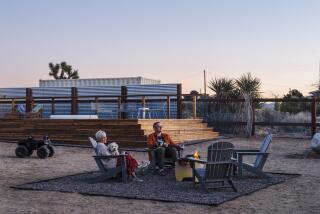‘It is kind of like creating a picture in a way. I try to put together a composition that is pleasing to the eye.’
- Share via
Joyce Anderson says she was always fascinated with stinkbugs and small animals scurrying around her rural Rancho Santa Fe home--just like any child. The difference, she says, is that she never outgrew it. A taxidermist who makes statues out of peacocks and rugs out of mountain lions, Anderson, 44, also takes on what most taxidermists won’t touch--household pets. Her curiosity about the function of animals turned to an interest in preserving them when she was 13. She worked as a taxidermist while earning her art degree at San Diego State University, then she taught for 10 years at Cardiff Elementary School. Anderson didn’t like the hard work of cleaning deer skins, but says the availability of new equipment and her marriage five years ago led her back to the craft that is now her occupation. She works out of her Rancho Santa Fe home filled with children and pets, and maintains a business office full of her stuffed works on Highway 101 in Leucadia. Anderson was interviewed by Times staff writer Nancy Reed and photographed by staff photographer Liliana Nieto.
There are people who just don’t want to part with their pet and just want to have it someplace in the house still. So I am here to help those people. After all, Trigger was stuffed, right?
But one thing about pets is, usually when they bring it in, it has just died and they are emotionally distraught over the loss--and I am a very sensitive sort of person to other people’s feelings. While they are feeling bad about their animal dying, I am feeling bad about their animal dying, too. I have animals and don’t like it when they die.
Although I bury mine. I would just as soon settle for a picture on my wall.
But I respect people who don’t want to give it up. They bring in pictures, and some poses are more expensive than others. If the animal is in a lying-down position, it takes less work. I like to put them in a tranquil, resting pose, then he looks like he is not supposed to take a step. It’s more natural. But some people want to have them sitting up.
A bird is generally an attractive- looking little thing, and they can put it in a cabinet or something like that, so I can see that more. It’s not like when somebody brings in their ancient cat who already looks old, and they don’t want to part with this thing.
When I start, it is kind of like taking a sock off your foot, you kind of peel the skin off the animal. It’s just never bothered me to get inside animals, with the eyes, blood and the meat, and the brains don’t bother me at all. I can sit there and eat my lunch and work on something at the same time.
My first bird I did was a duck that my brother had shot. It took me about 24 hours of no sleep because I didn’t know I could leave it. I was afraid the feathers would fall out or it would start to deteriorate. So I stayed up all day and all night.
A giraffe was the most difficult one I ever did. I had to carve the body from scratch. I spent a lot of time down at the zoo studying giraffes, and I took a lot of photographs. To do him, I had to get on a chair and reach up to do his head, and lay him down. It took me months--the skin was real thick and hard. It came from Africa.
Pictures and drawings are real important--I can’t get something right and accurate without them. It helps get the eyes in focus, and the balance is an important part--to have the legs with the pressure point on the feet at the right spot.
It really is an art. I look at it from that standpoint. Sometimes, people bring something in and I plan it as an artistic piece in a way. I think about the void spaces in the piece and the colors, the piece of wood that I put it on, or the natural setting that I am building it in. It is kind of like creating a picture in a way. I try to put together a composition that is pleasing to the eye.
And I like to make it look as lifelike as possible. But then I don’t want it. I don’t have to look at it anymore when they take it home.
More to Read
Sign up for Essential California
The most important California stories and recommendations in your inbox every morning.
You may occasionally receive promotional content from the Los Angeles Times.










